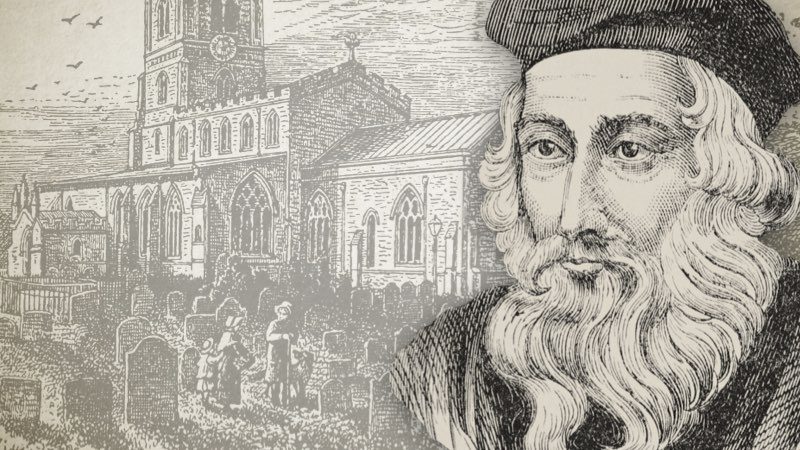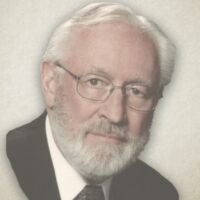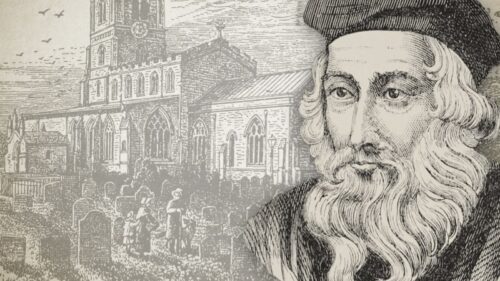
The “Morning Star” Of The Reformation
Ken Connolly, “The Church In Transition”
John Wycliff (1320-1384)
For a century or more before his birth numerous problems arose in England which were contributing factors to John Wycliffe’s ecclesiastical non-conformity. Due to his power-struggle with Pope Innocent IIl. King John I in 1213, yielded feudal sovereignly to the Papacy. That situation proved to be a very great detriment to England. As a result of that agreement between king and pope, 12,000 English pounds were annually taken from the English coffers and sent to the Papal See at Rome. Furthermore, large numbers of foreign ecclesiastics were brought into the British Isles. Those alien clerics, who owed greater allegiance to the Papacy or their native lands than they did to England, swarmed all over the nation and even infiltrated into some of the highest appointed positions in secular government. Such appointees were taking their assignments from the king, but were taking their orders from the pope.
One positive result, however, was that the situation galvanized the English barons to take action. Therefore, just two years later, on June 15, 1215, they forced King John I to sign the Magna Carta. That document became the charter of English personal and political liberty. Although we have already covered those events, the facts must receive mention again in order to understand John Wycliffe’s reactions to the persons and events of his day.
In 1320, John Wycliffe was born in Yorkshire in northeast England. Various spellings are given for his last name. “Wycliffe” and “Wiclif” are undoubtedly first and second respectively in common usage.
When he was 20 years old, Wycliffe was sent to study at Queens College, Oxford University Sixteen years later, he became the master of Balliol College. That title indicates that he was the head of the college, not just one of its teachers.
In 1631, Wycliffe accepted a “living” at Fillingham in Lincolnshire. Certain clergy positions of the day had a stipulated income which automatically went to the assignee filling the post. Such a situation was known as a “living.”
The records indicate that four years later a “John de Wyclif” received the first “wardenship” of Canterbury Hall. Whether or not that person is the same John Wycliffe is a matter of some debate.
At any rate in 1366, England’s King Edward III received a threatening letter from Pope Urban V. The King was ordered to appear at the Papacy and defend himself for default on payment of the annual stipends established by the agreement between King John I and Pope Innocent III in 1213. King Edward appealed to the British Parliament. That body’s unanimous decision was that such payment should be referred. The members of Parliament went onto assert that no English sovereign was at liberty to surrender the nations independence.
In the ensuing debate over the issue one doctor of theology publicly challenged John Wycliffe to defend Papal rights. Wycliffe therefore published a tract addressing the question. To the surprise of the clergy, however, Wycliffe defended the conclusion of Parliament. He acknowledged submission to Papal authority in ecclesiastical matters but he contended the right of any country to resist, even with force of arms, all interference from whatever source when that country’s inherent liberty and independence is impugned.
In the year 1372, two important events occurred. First, John Wycliffe was awarded a Doctor of Divinity degree. That fact is worthy of note because according to pertinent Papal documents Wycliffe was obviously not considered guilty of “heresy” at the time he received the degree. Otherwise, the degree would not have been conferred.
The second event was the arrival in England of a special Papal agent. That emissary from the Pope was commissioned to collect the unpaid annual stipends to the Pontiff. Those Papal dues by that time amounted to five times the revenue of the entire kingdom. Added to the overdue payments were the cost of the pomp and splendor of the Papal representative’s entourage which the church expected the British government to pay. Furthermore, England had to provide the Papal party spacious and luxurious quarters for the duration of the visit. As a patriotic Englishman, Wycliffe was outraged by the whole procedure.
On April 7, 1374, Wycliffe was awarded the rectory of Luttersworth in Leicestirshire. Also on July 26 of that same year, he was appointed a member of a commission being sent to Bruges, France. Those royal envoys were to meet with representatives of the Pope. The two groups were then to confer on certain “provisions.” The English government presented the following three complaints in regard to the issue of the Papal stipends:
1. There was an English law which had been passed 12 or 13 years previously known as the Statute of Provisions of Benefices. That law said that it was wrong to bestow a. living, proffered by the king, on any other subject, foreign or domestic, whether given or usurped. A guilty party would be imprisoned and forced to pay restitution.
2. The stringent law of “Praemunire” forbade the publication of any brief, state paper, or papal bull without the explicit consent of the king. Any violation brought banishment and the loss of all property and civil rights.
3. It was utterly presumptuous for any reigning pontiff, such as Urban V, to summon a sovereign of England to appear before a papal tribunal.
The English commission to the Bruges meeting became wearied with perpetual delays on the most frivolous pretexts. Therefore, after two unprofitable years, the conference ended in total failure. It was, nevertheless, of great benefit to John Wycliffe. Like Martin Luther’s later visit to Rome, that experience opened Wycliffe’s eyes all the more to see the need for ecclesiastical reform. Furthermore, the Bruges Conference made it increasingly obvious that John Wycliffe and John of Gaunt, the Duke of Lancaster, held similar views on the question of the proper relationship between the ecclesiastical and civil authorities. In time, John of Gaunt became John Wycliffe’s sponsor. The Duke of Lancaster was exceedingly rich and of royal blood. His patronage assured Wycliffe of future financial security and political protection.
Upon returning home in 1376, the royal commission made its report to Parliament. A bill was subsequently introduced specifying a long list of ecclesiastical abuses. An examination of the wording and some of Wycliffe’s contemporary treatises indicates strongly that John Wycliffe influenced the drafting of the bill.
In essence the bill asserted that property was subject to civil power and that righteousness was the only indefeasible title to dominion and property. An unrighteous clergy, therefore, should be subject to loss of property by civil authority.
Wycliffe’s writings and teaching began to incite criticism from the ecclesiastical hierarchy. Therefore, on February 19, 1377, Archbishop Sudbury summoned John Wycliffe to St. Paul’s Cathedral to answer his critics. The Bishop of London, William Courtenay, a maternal great- grandson of former King Edward I, presided over the meeting. Also attending were the Grand Marshall of England, the Duke of Lancaster, and five theologians who would defend Wycliffe. The tension at that gathering was intensified by the fact that Bishop Courtenay and John of Gaunt despised one another. In fact, before the session could really get under way a violent altercation between Courtenay and Lancaster caused the trial to be adjourned. Those actions aroused such public anger that a riot ensued.
Meanwhile, members of a number of mendicant orders had written a letter of grievances to Pope Gregory XI charging Wycliffe with theological error on nineteen separate issues. On May 22, the Pope responded by sending several Papal bulls to the Archbishop of Canterbury, the Bishop of London, Oxford University, and the King, accusing Wycliffe of teaching condemned doctrines. Essentially, those pontifical decrees addressed two issues:
(1) Could the church hold temporal endowments.
(2) Did the church have the authority to effect a man’s civil position.
Then, on June 21, 1377, King Edward III died. He was succeeded by his grandson who became Richard II. King Richard II was only twelve years old when he came to the throne and thus automatically became an integral part of that ongoing church-state controversy.
In 1378, based on the Papal Bulls of the preceding year, John Wycliffe was once again summoned to appear at St. Paul’s to defend himself and his writings. The location was later changed to Lambeth Palace. At that trial, a vast audience attended to demonstrate their support of Wycliffe. Members of that crowd from time to time cried out things like, “The Pope’s briefs should have no effect in England without the king’s consent” and “Every man is master in his own house.” An officer from the court of the Queen Mother entered the palace and demanded on her behalf that no judgment “be brought against Wycliffe at that time. Therefore, that trial also ended without the bishops accomplishing their objectives.
In March of that year. Pope Gregory XI died. Since 1309, all popes had been ruling from Avignon, France and been virtual puppets of the French kings. In 1378, the College of Cardinals elected Bartolomer Prignano to rule in Rome as Pope Urban VI. All too soon, the new pope demonstrated himself to be a proud, insolent, and avaricious man. Hence, thirteen French cardinals elected Robert of Geneva as Pope Clement VII to rule from Avignon. Thus began the thirty-eight years of Papal history known as the Great Schism. For nearly four-decades, there were always two popes—one in residence at Avignon and the other at Rome.
The concurrence of those events dwarfed the Wycliffe crisis. In fact, John Wycliffe actually grew in public favor. In the autumn of 1378, Wycliffe’s sponsor, John of Gaunt, sent soldiers into a church sanctuary to arrest some criminals hiding in the church building for protection from arrest. In the process of their arrest, two men were killed. Immediately church authorities protested that the Duke of Lancaster had violated the ancient right of sanctuary. John Wycliffe was appointed to read the subsequent public apology for the Duke’s action. In his De Ecclesia, Wycliffe asserted that the men were killed in resisting legal arrest. He further maintained that the civil power had the right to invade the sanctuary in order to bring escaped prisoners to justice.
By that time, John Wycliffe had reached the conclusion that the future of England would be determined by the voices who spoke for the English people. He therefore, organized the students who studied under him at Oxford University Wycliffe affectionately designated them “poor preachers,” but his detractors jokingly called them “Lollards” which is a Dutch word meaning “mumblers of prayers,” In time, the term became a generic, derogatory epithet for all who attacked the Roman Church. To give his young disciples the tools they needed to defend themselves in argument, Wycliffe set about to translate the Latin Vulgate into the English language.
In 1379, Wycliffe also began to produce tracts on the Scriptures, the Church, the king, and Papal authority. Wycliffe’s De Officail Regis has been considered by some scholars a virtual declaration of war against papal monarchy.
Two years later, John Wycliffe published tract De Eucharista. In it he attacked the Roman Catholic doctrines of transubstantination, which affirms that the real, corporeal presence of Christ is literally in the Eucharist (communion) elements. Wycliffe termed such a doctrine to be “blasphemous folly.” He further stated that he simply would not dare to affirm that the communion bread after consecration was “essentially, substantially corporeally and identically” the body of Christ. Wycliffe did, however, believe that Christ was present at the celebration of the Lord’s Table symbolically rather than naturally. His views were very similar to those of the Protestant Reformation but preceded them by 125 years.
The Chancellor of Oxford University, Dr. William Barton, along with twelve other professors, immediately condemned Wycliffe’s thesis. Even John of Gaunt tried to restrain his long-time protege’, but that only caused a rift between them which widened drastically at the outbreak of the Peasant’s Revolt. That popular uprising was the direct result of the Hundred Years’ War which at that time had been dragging on for just short of a half century.
A special poll tax had been levied to defray the mounting costs of war. In 1381, Wat Tyier led a revolt of his fellow peasants to protest the increased taxation. King Richard II responded by rescinding the burdensome tax and agreeing to meet some of the other demands of the rebels. Not all the participants in the Peasant’s Revolt, however, escaped punishment. Wat Tyier, for instance, was beheaded. Under the persuasion of torture, one of Tyier’s followers, John Ball, “confessed” that he had learned his subversive doctrines from John Wycliffe. That and similar allegations were never proven and the extent of the connection, if any, between Wycliffe and the Peasant’s Revolt remains highly conjectural.
In spite of continuing accusations that he was teaching theological error and encouraging social revolution, 1381 was a good and productive year for John Wycliffe. In that tumultuous year, he finished his original translation of the New Testament into vernacular English. That was the first time the English people ever had a major portion of the Bible in their own language.
The vacancy occasioned by the murder of Archbishop Sudbury in 1382, was filled by Wycliffe’s long-time antagonist William Courtenay. Determined to end “Wycliffe-ism,” Archbishop Courtenay convened an ecclesiastical court of bishops, theologians, and canonists (persons who are experts in ecclesiastical law) at Blackfriar’s Convent. That body brought pressure on the House of Lords to condemn Wycliffe as a heretic and to call for the imprisonment of Wycliffe’s itinerant preacher. The scheme failed because it was annulled by the House of Commons. That thwarting of his plans on the part of the Commons made Courtenay reevaluate his efforts, as his predecessor had lost his life for overstepping his bounds of authority.
After the Blackfriar’s incident, the controversy around John.Wycliffe began to settle down somewhat, but the following year he suffered his first paralytic stroke. On December 28, 1384, Wycliffe suffered a second stroke during a church service he was conducting. That paralysis affected his tongue and he never spoke again. Three days later on the eve of the coming year, John Wycliffe died. He was sixty-four.
Nevertheless, the effect of Wycliffe’s life and work continued to live after him. Five years after his death, Wycliffe’s translation of the Old Testament was completed through the assistance of his old friends Nicholas Hereford and John Purvey.
On the other hand, the efforts of his enemies did not stop either. In 1408, a church sifod was held in Oxford in an attempt to suppress the circulation of Wycliffe’s English version of the Scriptures. It was, however, too late. Then, thirty-one years after his death on May 4, 1415, the Council of Constance ordered that John Wycliffe’s remains be dug up and burned. Pro-Wycliffe feelings in England were, however, too high at that time for those orders to be carried out. Forty-five years after his death (1428), that previous order was repeated by Pope Martin V. That time the order was carried out by Bishop Fleming. Wycliffe’s ashes were then thrown into the Thames River. It has been said that Wycliffe’s ashes drifted down the Thames, out into the ocean, and around the world!
The ideas put forth by John Wycliffe greatly influenced the Czech reformer John Huss, who had also been condemned by that same Council of Constance which had (in 1415) ordered Wycliffe’s bones dug up and burned. Huss was burned at the stake that same year. Before he died, however, Huss, like Wycliffe, taught against the doctrine of the “real presence” of Christ in the Roman Catholic Mass. In addition, it was Huss’ life and work which inspired William Tyndale to make another English translation of the Bible. Tyndale’s translation highly influenced the later King James Version of 1611.
Furthermore, after his death, Huss’ followers fled into Saxony and were given refuge on the estate of Nicholas Ludwig, Count von Zinzendorf Von Zinzendorf and the Hussite Brethren founded the Moravian Church. It was in Moravian meetings in London that John and Charles Wesley received Jesus Christ as their Saviour. The subsequent Wesley revivals swept England, Wales, and the British North American colonies. John Wycliffe had truly “cast his bread upon the waters” and it in no wise returned to him. void! It was because of that tremendous influence, reaching far beyond his own lifetime, that John Wycliffe has been called the “Morning Star of the Reformation.”
Ken Connolly (1927-2005) was a British-American Baptist pastor, professor, presenter and writer. He served as the Pastor for Grace Baptist Church, Fort Worth, Texas (1953-1955), Berean Baptist Church, Houston, Texas (1964-1965) and Berean Baptist Church, Orange, California (1966-1976). He was a Bible Professor at Baptist Bible College, Springfield, Missouri (1959-1964) and at Pacific Coast Baptist Bible College, San Dimas, California (1988-1993). He was one of the pioneers in Christian television broadcasting, operating channel 46 in Los Angeles (1973-1975). During the latter part of his ministry, he hosted several Christian documentaries and served as an itinerate preacher at churches and conferences worldwide.
Ken Connolly Sermons
Ken Connolly's Biographical Sketches




